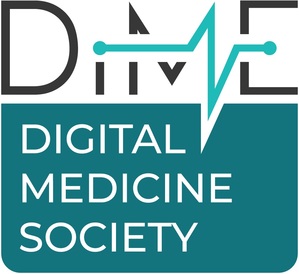BOSTON, Sept. 15, 2021 /PRNewswire/ -- Today, a pre-competitive collaboration hosted by the Digital Medicine Society (DiMe) published data reporting the current state of research related to digital clinical measures and sources of funding. This systematic review, published in the Journal of Medical Internet Research (JMIR), identifies critical gaps in academic research related to digital clinical measures while adoption of digital health continues to soar.
In the U.S. today, over half of the population utilizes digital health tracking tools (DeSilva et al.) and investment in digital health innovation has skyrocketed, hitting nearly $15 billion USD for the first half of 2021 alone (Krasniansky, Zweig, & Evans). Yet concerns about the security of these products, the risk of introducing new inequities and bias into healthcare, and privacy issues remain unaddressed.
These new data published today reveal that in the last two years, out of 295 of research studies published on digital clinical measures, there was only one academic publication reporting cybersecurity research, one study examining data rights and governance, and zero publications reporting research into the ethical implications of remote patient monitoring tools.
"We rely on academic researchers to be the arbiters of new digital health products and ensure that this field, which is advancing so rapidly, is worthy of public trust," says Jennifer Goldsack, CEO of DiMe. "Outside of collaborations such as The Playbook that yielded this research, academic institutions are one of the few places that convene the interdisciplinary experts needed to bridge the growing chasm between the promised benefits of these measures and their potential risks. We found substantial research activity examining the underlying performance of digital measurement products -- verification of the sensors, analytical validation of the algorithms, and clinical validation, otherwise known as 'V3'. Now it's time to expand focus -- and funding -- to address the paucity of research addressing ethics, data rights, and cybersecurity."
This new research indicates that government agencies and independent foundations are funding most of the academic research studies related to digital clinical measures, with industry funding of these studies lagging behind.
"Realizing the incredible potential of these technologies starts with funding academic research," says Jessilyn Dunn, co-author and head of Big Ideas Lab at Duke University. "This paper confirms our hunch. The academic research we need most is not happening in part because there is not enough funding to support these new, essential fields of study. With more funding we will see more research, which is imperative to continue advancing the field of digital medicine."
About the Digital Medicine Society: The Digital Medicine Society (DiMe) is the professional society serving the digital medicine community, driving scientific progress and broad acceptance of digital medicine to enhance public health. At DiMe, our commitment to fully integrating experts from all of the disciplines comprising digital medicine is unwavering. From regulators to white-hat hackers, ethicists to engineers, and clinicians to citizen scientists, we are proud to welcome all experts committed to ensuring that digital medicine realizes its full potential to improve human health. Join us!
Media Contact: Jamie Gray, [email protected], 310.699.3163
References:
DeSilva, J., Prensky-Pomeranz, R., & Zweig, M. (n.d.). Digital Health Consumer Adoption Report 2020. Rock Health. Retrieved September 14, 2021, from https://rockhealth.com/reports/digital-health-consumer-adoption-report-2020/.
Krasniansky, A., Zweig, M., & Evans, B. (n.d.). H1 2021 digital HEALTH Funding: Another BLOCKBUSTER Year...In six months. Retrieved September 14, 2021, from https://rockhealth.com/reports/h1-2021-digital-health-funding-another-blockbuster-year-in-six-months/
SOURCE Digital Medicine Society (DiMe)

Related Links
WANT YOUR COMPANY'S NEWS FEATURED ON PRNEWSWIRE.COM?
Newsrooms &
Influencers
Digital Media
Outlets
Journalists
Opted In




Share this article